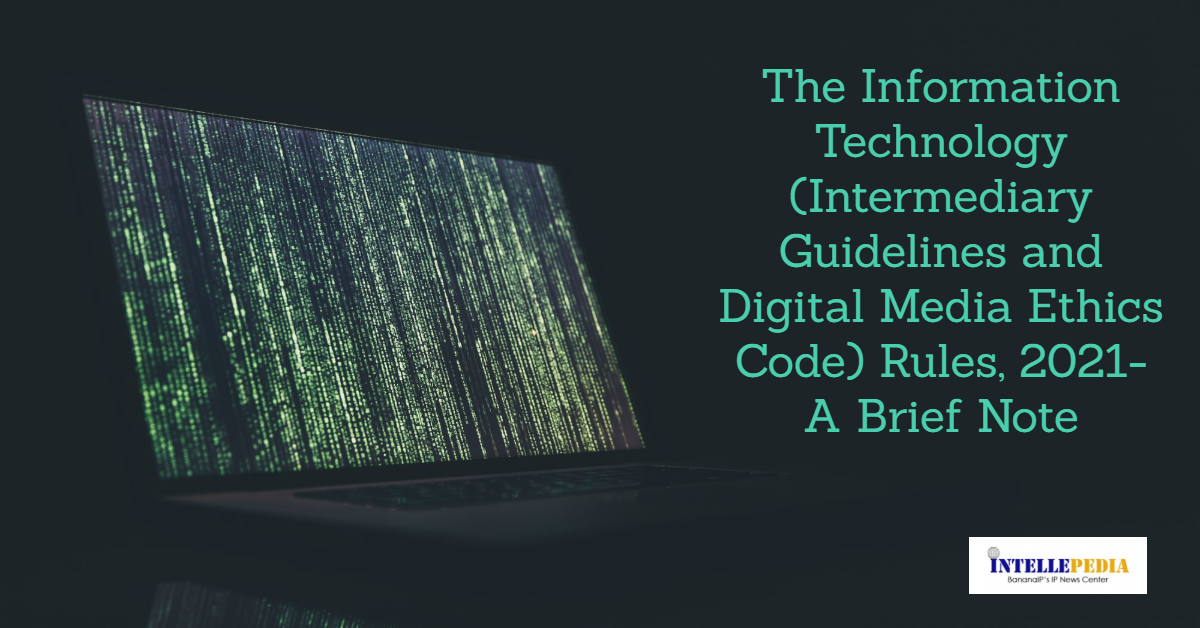The Information Technology (Intermediary Guidelines and Digital Media Ethics Code) Rules, 2021- A Brief Note
The Government of India through the Ministry of Electronics and Information Technology (MietY) has recently issued a notification, for implementing the Information Technology (Intermediary Guidelines and Digital Media Ethics Code) Rules, 2021 (2021 Rules). Apart from its application to intermediaries as defined under section 2(w) of the Information Technology Act, 2000, the new rules are applicable to Social Media Intermediaries (SMIs), Significant Social Media Intermediaries (SSMIs) and Digital Media Platforms (DMPs). Additionally, Original Curated Content Platforms (OCCPs) have also been brought under the ambit of these new rules.
In order to ensure the effective implementation of the 2021 Rules, these guidelines include several new mechanisms as compared to the Information Technology (Intermediaries Guidelines) Rules, 2011 (2011 Rules). The new guidelines are aimed at increasing the liability of intermediaries with regard to the information being made available by them. The added mechanisms ensure that the intermediaries take immediate action with regard to any unlawful or infringing information being made available by them. Some of these mechanisms are highlighted below.
For Intermediaries (SMIs and SSMIs)
Due diligence and Grievance redressal:
- The 2011 Rules required intermediaries to maintain records of the content and related information for a period of ninety days after receiving a complaint with regard to such content. The 2021 Rules require intermediaries to maintain the records of any content referred to in a complaint for a period of one hundred and eighty days or more as may be notified by the authorities, for the purposes of further investigation.
- As per the 2021 Rules, the information collected from a user by an intermediary for registration on the computer resource, shall be retained by the intermediary for a period of one hundred and eighty days after any cancellation or withdrawal of the user’s registration, as the case may be.
- SSMIs are required to expressly provide details of the ownership and/or origin of the information being made available to the users on the platform.
- SSMIs must allow the users who either register for their services or use their services within India, to voluntarily verify themselves as per the mechanism deemed appropriate by the SSMI. After being verified, the respective user must then be provided with a verification mark that is visible to all the users of the service.
For Digital Media Platforms
Code of Ethics and Safeguards:
- The Code of Ethics and Safeguards are applicable to the publishers of news and current affairs content and publishers of online curated content.
- Under the new guidelines, the Grievance Redressal Mechanism has been divided into three levels:
- Level I is the Self-regulating Mechanism which requires the publishers to establish a grievance redressal mechanism and appoint a Grievance Officer based in India, to resolve the grievances received by him as per the guidelines provide for the same.
- Level II requires establishing one or more self-regulating bodies consisting of publishers, which will be an independent body constituted by publishers or their associations. Following this, the self-regulating body must register itself with MeitY, within a period of thirty days after these rules have been notified.
- Under Level III of the mechanism:
- MeitY shall co-ordinate and facilitate the adherence to the Code of Ethics by publishers and self regulating bodies, develop an Oversight Mechanism among other functions as prescribed under the 2021 Rules.
- MeitY shall constitute an Inter Departmental Committee, called the Committee, consisting of representatives from the Ministry of Information and Broadcasting, Ministry of Women and Child Development, Ministry of Law and Justice, Ministry of Home Affairs, Ministry of Electronics and Information Technology, Ministry of External Affairs, Ministry of Defence, and such other Ministries and Organisations, including domain experts, that it may decide to include in the Committee.
The Information Technology (Intermediary Guidelines and Digital Media Ethics Code) Rules, 2021, include news aggregators and news publishers as well within its purview. However, this has been challenged by several journalists through a petition filed in the Delhi High Court, claiming that the new rules are not applicable to news media entities. The Delhi High Court has subsequently notified the Centre, while seeking a response to the petition.
Authored and compiled by Neharika Vhatkar (Associate, BananaIP Counsels)
This note on the Information Technology (Intermediary Guidelines and Digital Media Ethics Code) Rules, 2021, is brought to you jointly by the Entertainment Law and Consulting/Strategy Divisions of BananaIP Counsels, a Top IP Firm in India. If you have any questions, or need any clarifications, please write to contact@bananaip.com with the subject: Copyright Office Updates
Disclaimer: Please note that these case updates have been put together from different sources, primary and secondary, and BananaIP’s reporters may not have verified all the decisions published in the bulletin. You may write to contact@bananaip.com for corrections and take down.



